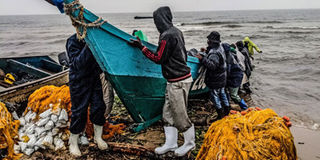Govt to test community at Kasensero site for Covid-19

Exposed. Fishermen at Kasensero Landing Site in Kyotera District last year. The landing site has been identified as one of the high-risk areas for Covid-19. Photo by Ambrose Musasizi
What you need to know:
- Dr Felix Kaducu, the dean of Faculty of Medicine, said if the laboratory is established, it would also deal with other emergency outbreaks.
The Ministry of Health is to carry out mass community testing at Kasensero Landing Site in Kyotera District to contain the spread of coronavirus pandemic.
Dr Diana Atwine, the permanent secretary, said the landing site is one of the high-risk areas for Covid-19 because it is located at the Uganda-Tanzania border.
“We have decided to do mass testing at the landing site because we got information that these people have begun going to neighbouring communities due to the floods yet they have been interacting with Tanzanians. We cannot allow them to go into other areas without being tested,” she told administrators of Masaka Regional Referral Hospital on Sunday.
The facility is hosts the regional Covid-19 quarantine centre where four cases are undergoing treatment.
Unlike cross-border cargo truck drivers from Tanzania who are screened and tested for Covid-19 on rival at Mutukula border, residents in neighbouring villages and towns walk freely across either side of the border.
Tanzania, unlike its neighbours, has not declared a nationwide lockdown, but has closed schools and colleges, banned social gatherings, prohibited unnecessary movements and suspended international flights. So far, the country has recorded 480 confirmed Covid-19 cases and 18 deaths.
Dr Atwine said the ministry would dispatch a health surveillance team to Kasensero this week to find out the number of residents and new entrants in the area.
“We will base on that information to know how many random sample tests we can carry out in a single day. Our target is to ensure that the virus does not circulate within the population,” she said.
The permanent secretary also said they had received information from local leaders that stagnant water in Kyebe and Kasensero Town Council caused by flooding is exposing residents to water-borne diseases such as dysentery, cholera, typhoid and malaria.
Dr Atwine said the ministry would distribute free insecticide-treated mosquito nets to all residents.
Dr Ronald Mutebi, the head of epidemiology in the greater Masaka region, said their recent survey revealed that residents were freely using Lake Victoria to cross to either sides.
“Kasensero has many people who come and go, they need to be monitored if we are to contain the spread of coronavirus,” Mr Charles Njuba, the district vice chairperson, said.
Meanwhile, the Health ministry has said it will establish a mobile laboratory at Gulu Regional Referral Hospital to test coronavirus.
It is one of the three laboratories that will be established across the country to offer a rapid diagnosis and response to the virus.
The second one will be set up at Bugera Hospital at Mpondwe to handle the border line with DR Congo while the third one will be in Tororo Town to handle Busia and Malaba border points.
Each laboratory is expected to run at a maximum capacity of 288 tests per day.
The move follows a rejection of a proposal by Acholi regional Covid-19 taskforces to allow Gulu University’s Faculty of Medicine laboratory begin conducting the tests.
Local authorities have since March been negotiating with government to finance a face-lifting of the facility and accredit it to begin conducting the tests.
Dr Felix Kaducu, the dean of Faculty of Medicine, said if the laboratory is established, it would also deal with other emergency outbreaks.
However, Dr Ruth Jane Aceng, the Health minister, said: “It is not possible because the only test we have is the PCR (polymerase chain reaction) that is currently available using the Berlin Protocol. Even getting reagents for these tests is currently extremely difficult because you place in order and you are given a very small quantity.”
“We (country) only have tests enough for one week and every time we are sitting on the edge of the chair wondering what is going to happen next, and that is a challenge,” she added.
Uganda currently applies only PCR tests using the Berlin protocol diagnostic detection of Covid-19 approved by the World Health Organisation. It has not been able to afford alternatives such as the Cobas and Gene Expert machines.




